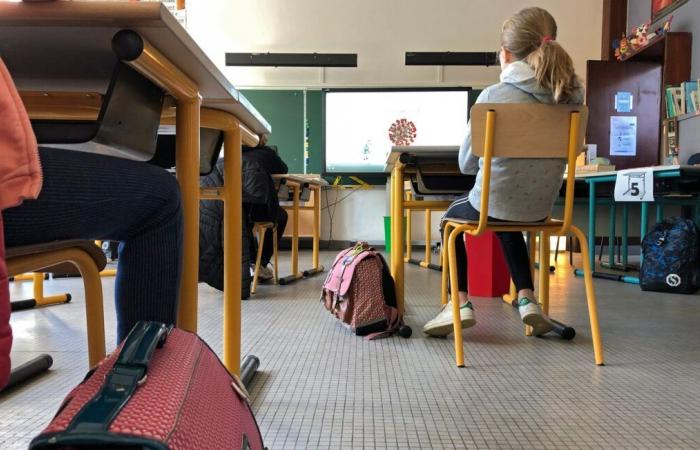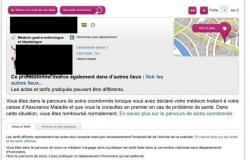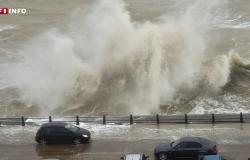The very latest version of the emotional life and sexuality education program was released on Wednesday evening, and it is more or less the one which should see the light of day at the start of the 2025 school year and which will be voted on on January 29 during of the next Higher Council of Education. Few differences with the draft program presented in 2024, but still a refinement of the most sensitive notions, such as that of “gender identity”, according to the version consulted by 20 Minutes.
While the term “gender identity” had appeared more than fifteen times in certain versions of the text, causing controversy, it only appears seven times in the latest version of the program. “The notion of gender identity is in the Penal Code. It is in high school that we learn it and we address questions of sexuality in secondary education,” the Minister of Education, Élisabeth Borne, defended this morning on France Inter. Also gone are the words “heterosexuality, homosexuality, bisexuality, asexuality” which explained “sexual orientation”. The text also mentions that sexuality education will be implemented without “replacing the role of parents and families of students”, a fear expressed in particular by Catholic education.
In kindergarten, know how to name the parts of the body
In kindergarten, and before the age of 4, the objectives are to “know your body”, to “understand what intimacy is”, to “learn to express agreement or refusal, learn to consider and respect a refusal “, or to “apprehend and understand equality between girls and boys and the freedom to be oneself.” From the age of 4 or “as soon as previous learning can be observed”, the child can begin to name emotions or even learn to “identify a trusted person”, who they can contact in the event of violence. suffered for example. The wording was revised by removing the identification of “intimate parts”, in favor of the more general phrase “naming the different parts of the body”.
This is an example of writing that could allow, according to some, political exploitation and other attacks. “Basically we were all more or less in agreement, all the members of the Higher Council of Education were quite unanimous on the necessity of this text. The previous program was a little too poor. We had a problem in the drafting of this program which could give rise to political exploitation. There was pure fake news, especially in the JDD, a web of lies, it was shameful to have so many false things,” thunders Laurent Zameczkowski, spokesperson for the Federation of Parents of the public education (Peep).
From CP to CM2: Identify discrimination and changes in the body
From elementary school, and as the child grows, he can learn to “promote egalitarian relationships” or “identify discrimination resulting from stereotypes” (in CE1) and discover what puberty is. The program prescribes to “know the changes [du] body” from CM1 and to “prevent the risks linked to the use of digital technology and the Internet” from CM2.
The old version made questions of sexuality appear from CM1-CM2. This is no longer the case. A little too late for Guislaine David, joint general secretary and spokesperson for SNUipp-FSU. “We are questioned by children about this from CM2 onwards. Teachers will be confronted with it,” she believes. Remember that almost one in five boys aged 10 has access to pornography every month, for around thirty minutes on average, according to an Arcom study. The average age of first exposure to pornography is estimated to be between 8 and 10 years old.
-From middle school to high school: Protect yourself and respect others
From middle school onwards, questions of sexuality are addressed more head-on. Teachers must help students “develop a critical and respectful understanding of interpersonal relationships and issues associated with sexuality” (in 4th grade) as well as “build a reciprocal and egalitarian relationship” (3rd grade). The notion of “pleasure” mentioned in a previous version of the program (“ Approach sexuality as a complex reality combining pleasure, love, reproduction “) was deleted in favor of wording placing greater emphasis on responsibility (only “remains Approaching sexuality as a complex reality “). This is also the case in the preamble, which initially defined sexuality as associated with “pleasures” and “desires” and formulated the objective of a “fulfilling life”, which no longer seems relevant.
Finally, high school students learn to “protect themselves and others” in the age of social networks (in Second grade) or to “give or refuse consent” (in First grade). The First should make it possible to address “behaviors, temptations, pleasures and risks” through, for example, the study of works) while the Terminale “brings together the acquired knowledge allowing the student to understand sexuality as a responsible young adult “.
Consensus content, practical details less so
“There is nothing problematic in this program, we need to say that. What does not suit us is that we still do not have a correct framework on who teaches it, over what time and with what budget”, comments Jean-Rémi Girard, of Snalc, the National Union of High Schools , colleges, schools, higher. If the content of the program achieves consensus among all the organizations that make up the CSP – except perhaps the Catholic organizations – the modalities of application will, however, be much more discussed.
Among the co-pilots of this program, Franck Burbage believes that there is no need to train all the teachers. “There is this idea on all subjects that we are not trained enough. But what is a teacher? A teacher has qualified training, he is someone who knows sciences, letters, arts and who has a sensitivity to young age. I do not share the idea that teachers are insufficiently trained. We are not going to create a sexuality education Capes. What is needed is collective construction,” argued the inspector general of philosophy in an interview he gave us in October.
Not sure that all teachers will follow suit… “We must be able to have training, otherwise we may be called into question by all those who oppose such as the sphere of “vigilant parents” [réseau de parents d’élèves créé par Éric Zemmour et directement piloté par des membres de Reconquête]fears Guislaine David, who asks for “means”.






